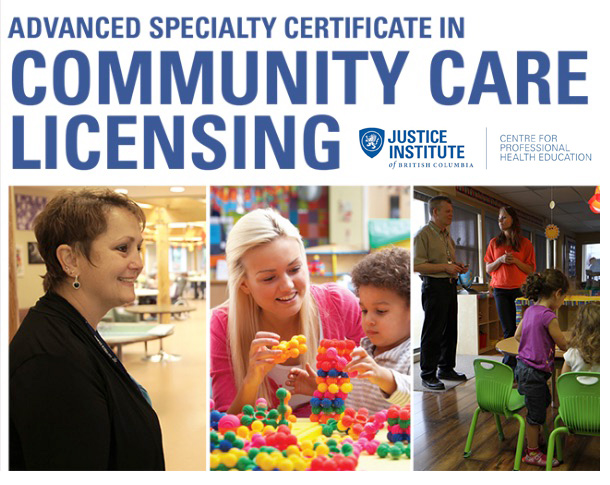Our good friends at the Justice Institute of British Columbia (“JIBC”) have an opportunity that will be of interest to many of our readers. A new bursary is available to cover the course tuition for their Community Care Licensing program. Students wishing to receive training to become a certified Community Care Licensing Officer (CCLO) can have the cost of their course tuition covered for up to 2 terms. For more information on the role of the CCLO, the Justice Institute have produced an informative video message. Continue reading below for information and eligibility requirements for the CCLO bursary.
Bursary Announcement
JIBC are pleased to announce a new funding opportunity for those interested in taking courses in the Advanced Speciality Certificate in Community Care Licensing program at the Justice Institute of British Columbia. This bursary covers $300.00 of course tuition for up to two (2) courses per term and will be offered to current Community Care Facility Licensing Officers, new students in their first term of study, and aboriginal learners living in the province of BC.
Please note: this funding will be offered only in the fall 2017 and winter 2018 terms and there are a limited number of bursaries available each term.
Please see the details of the bursary below and further details in this pdf. You can email any questions about the bursary or the Community Care Licensing program to cclo@jibc.ca. More information including course descriptions can be found on the CCLO Webpage at www.jibc.ca/cclo.
Community Care Licensing Officer Bursary
BC residents taking courses in the Advanced Specialty Certificate in Community Care Licensing program may be eligible to receive financial support for enrollment in courses in the fall 2017 and winter 2018 semesters.
Value
The Community Care Licensing Officer (CCLO) Bursary is offering the following support:
- A bursary for current licensing officers in BC that covers $300.00 of the course tuition for up to two (2) courses per term.
- A bursary for new CCLO students (those starting their first course in the fall 2017 term or winter 2018 term) for $300.00 of the tuition for one (1) course for each student.
- A bursary for aboriginal learners that covers $300.00 of the course tuition for up to two (2) courses per term.
Please refer to the criteria to ascertain the level of bursary eligible for your situation. There is a limited number of each type of bursary available in each term. Please respect the application deadlines for each term.
Who Should Apply
There are three categories of eligible students: 1) current licensing officers, 2) new students aspiring to become licensing officers, and 3) aboriginal learners. To be eligible for the bursary applicants must be BC residents.
- Current licensing officers must be employed by a BC Health Authority and may be enrolled in the full program OR taking up to 3 courses as professional development.
- New students aspiring to become licensing officers must be admitted to the program and enrolled in at least one course per semester.
- Aboriginal learners who are new or currently enrolled in the program.
Application Deadline
- August 15, 2017 for courses starting September 2017
- December 4, 2017 for courses starting in January 2018
Application Form
Complete the CCLO Bursary application form online. We recommend you print a copy for your files prior to submitting your completed form. For further information email financialaid@jibc.ca or cclo@jibc.ca.
The courses offered in the period covered by the bursary are:
Fall 2017 (September start)
CCLO-3300 Administrative Law – 3 credits
This course examines all statutes and regulations relevant to the role of Licensing Officers within a community care setting. The course explores delegation and procedural fairness. The learner will gain an appreciation of https://bccare.ca/wp-content/uploads/2022/08/medcare-img22.jpgistrative law and apply statutory decision-making in context to their role as delegates of the medical health officer. Prerequisite: None
CCLO-3301 Vulnerable Populations in Licensed Care Facilities – 3 credits
This course provides an opportunity to analyze the diverse social, physical, emotional, cultural, spiritual, and developmental care needs of vulnerable populations found in licensed community care facilities. Learners will identify organizational systems and community partners that support these populations. Challenges and barriers that may impact the persons in care are discussed. Learners will differentiate appropriate programming and care standards for vulnerable populations and have an opportunity to evaluate childcare and residential care plans. All topics are presented from the perspective of risk assessment and sound decision-making that will allow licensing officers to promote the optimal health, safety, and dignity of persons in care, and to work within the broader health care system. Prerequisite or Corequisite*: CCLO-3300
CCLO-3302 Ethics in Licensing Practice – 3 credits
This course explores ethics in the context of inspections and investigations, decisions, behaviours, and situations that may arise in the profession of community care licensing. Learners will have an opportunity to discuss ethical principles, concepts, and theories. Using a variety of case studies and scenarios, learners will demonstrate ethical decision making and employ ethical prevention strategies. The course focuses on process dilemmas related to political neutrality, confidentiality, privacy, fairness and accountability, as well as issues related to good, just and legitimate public policy. It is designed to give the learner an appreciation of the importance of ethical behaviour in organizational settings, specifically in the field of community care licensing.
Prerequisite or Corequisite*: CCLO-3300
Winter 2018 (January start)
CCLO-3303 Lifespan Development – 3 credits
Community Care Licensing Officers assess the health and safety risks of persons in care in a variety of settings and circumstances across the human lifespan. This course examines the physical, cognitive, and socio-emotional aspects of development through the lifespan. Learners are introduced to theories of human developmental psychology and will examine the social contexts of development including family relations, peer groups, friendship, and the appropriateness of care in context to physical, emotional, and spiritual health, cognitive stimulation, and cultural and social connectedness. Prerequisite: None
CCLO-3405 Human Relations – 3 credits
During this course learners will focus on professional communication, including interprofessional and interpersonal interactions, written and oral commentary, and presentation strategies, and will develop an appreciation of cultural and ethnic diversity in the field of community care licensing. Collaborative decision-making and the benefits of teamwork and nurturing partnerships in the multi-disciplinary field of community care licensing will be evaluated. The role of coaching and client education will be addressed in context to navigating within applicable legislation and regulations. Prerequisite: None
CCLO-3406 Inspection, Compliance, and Enforcement – 3 credits
This course provides the learner with essential knowledge and skill required to effectively assess the health and safety risk of people being cared for in licensed facilities. The course covers the application process, facilities compliance inspection, including risk assessment, considerations for exemptions, progressive enforcement, and appeals. Learners will have an opportunity to progress through each of these components while utilizing real life examples to depict the elements of initial application and inspection through to progressive enforcement to ensure organizational compliance. Learners will explore the concepts of reconsideration and appeal. The importance of accurate and thorough documentation is discussed. Prerequisites: CCLO-3300, CCLO-3301, and CCLO-3302
*A prerequisite is a requirement that must be met before you take a course, while a corequisite is a course that must be taken at the same time. Some requirements may be taken as either a prerequisite or corequisite.








